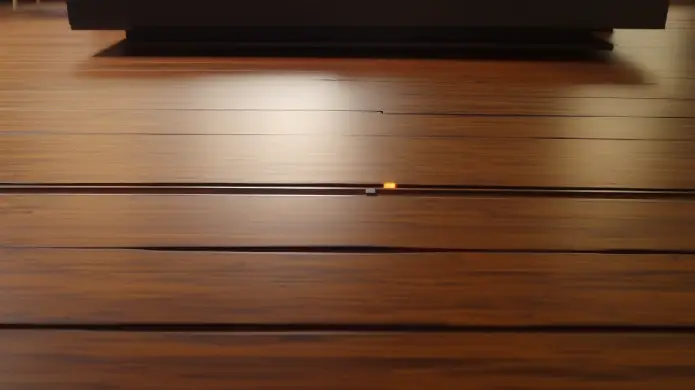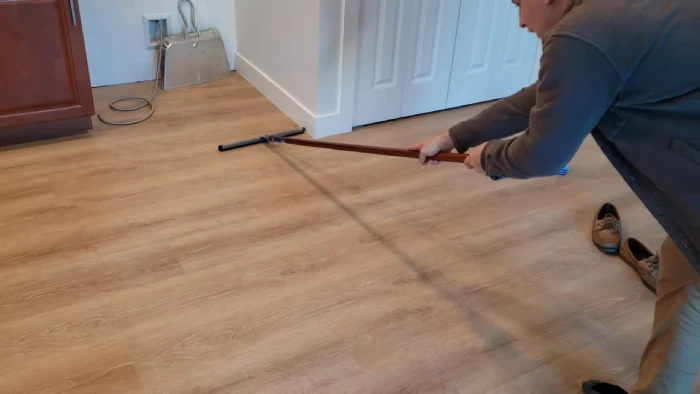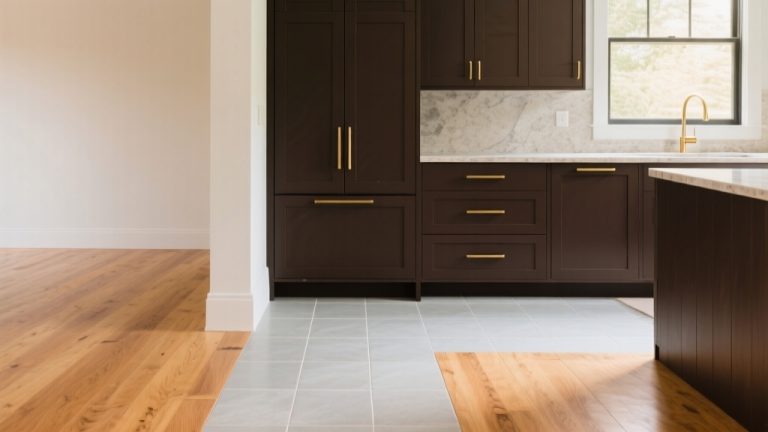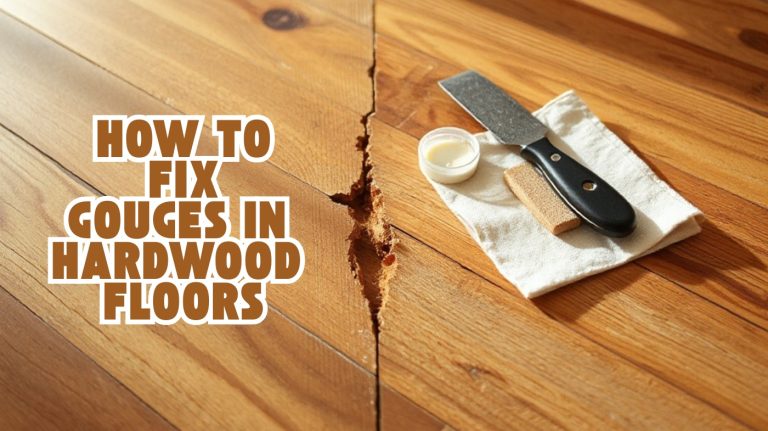Do Roombas Scratch Bamboo Hardwood Floors: 5 Reasons
Robot vacuums’ convenience and ease of use are undeniable, but homeowners with bamboo and hardwood floors are understandably hesitant about using them. The fear of scratches and damage to their floors is a valid concern.
But the truth is Roombas won’t scratch bamboo hardwood floors if they are manufactured with soft brushes, rubbery wheels, and properly maintained. The soft brushes and wheels are gentle on the surface of the bamboo, preventing any potential scratches or damage.
However, proper maintenance is key to avoiding any risks. Regularly cleaning and inspecting the Roomba’s wheels and brushes will help prevent any accumulation of dirt, sand, or small objects that could scratch your floors.
Let’s explore the nitty-gritty details of why Roomba robot vacuums may cause scratches and, most importantly, what you can do to prevent them. So keep reading and tackle this floor-scratching dilemma head-on.
Why Roomba Robot Vacuums May Scratch Hardwood Floors?
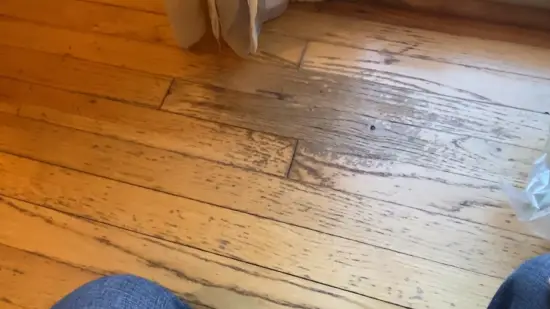
If you’re worried about your Roomba scratching your hardwood floors, there are a few key points to consider.
- Debris stuck under the wheels
- Jammed wheels
- Broken outer components
- Hard plastic wheels
- Beater brush bar
Let’s discuss these reasons in detail:
1. Debris Stuck Under the Wheels
When debris gets stuck under the wheels, it can cause scratches on bamboo hardwood floors. The tiny particles, like sand and gritty dirt, act as abrasive agents that can damage the floor’s surface. As the robot vacuum moves, these trapped particles are dragged across the floor, leaving behind scratches and scuffs.
2. Jammed Wheels
If debris collects in the wheels of your Roomba, particularly the front caster wheel, it can cause the wheel to become jammed. A jammed wheel will not rotate freely, leading to scratches on your bamboo hardwood floors as the robot vacuum continues to move.
3. Broken Outer Components
Despite their advanced designs, robot vacuums sometimes experience mechanical failures, resulting in broken outer parts that can come into contact with the floor and cause damage.
When the outer components of a robot vacuum break, there is a risk that they may scratch your bamboo hardwood floors. Here are five potential ways in which broken outer components can cause damage:
- The broken twirly piece may scrape against the surface, leaving behind visible scratches.
- The damaged brushes may have rough edges that can scrape and mar the smooth finish of the bamboo hardwood.
- Broken wheels may drag across the floor, creating deep grooves that are difficult to repair.
- Cracked plastic housing may expose sharp edges that can dig into the surface, resulting in unsightly marks.
- Loose or detached parts may get caught under the robot vacuum, causing it to jitter and potentially scrape against the floor.
4. Hard Plastic Wheels
Robot cleaners with hard plastic wheels, particularly those with flat edges, can potentially scratch hardwood floors, including bamboo. These wheels can create circular scratches as they spin, leading to unsightly and irreversible damage to your beautiful bamboo hardwood floors.
5. Beater Brush Bar
Though most robot vacuums use suction for cleaning, some high-spec models come with brush attachments. These brushes can cause scratches on hardwood floors if not properly adjusted or maintained.
Prevention Tips for Avoiding Scratches
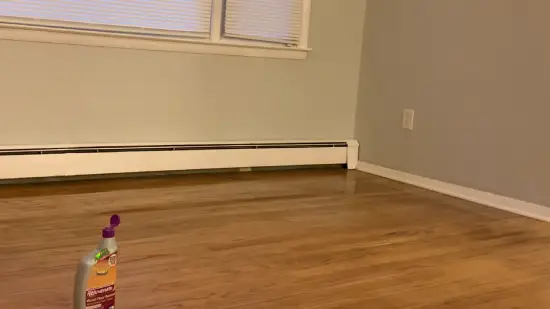
Before using your Roomba robot vacuum on your hardwood floors, you should take some pre-cleaning preparation steps to avoid scratches.
1. Pre-Cleaning Preparation
Make sure you’ve cleared the floor of any debris or objects that could potentially cause damage or jam the wheels of the robot vacuum. You can avoid unnecessary damage by taking a few minutes to prepare the area before using the robot vacuum.
2. Use Soft Wheels
To prevent potential damage, opt for a robot vacuum with soft wheels that won’t harm your floors. Soft wheels, such as rubber or round-edged plastic, are less likely to leave marks or scuffs on your bamboo hardwood floors.
These wheels provide a cushioned and smooth glide, allowing the robot vacuum to move effortlessly across your floors without causing any harm.
3. Regular Cleaning of Wheels
Regularly cleaning the rubber wheels of the robot vacuum is crucial to prevent debris buildup and ensure smooth navigation. This is particularly important for maintaining the effectiveness of the vacuum when cleaning bamboo hardwood floors.
Over time, the wheels can accumulate dirt, dust, and hair, hindering the vacuum’s movement and potentially scratching the delicate flooring. Cleaning the wheels regularly removes any trapped debris and prevents it from scratching your bamboo hardwood floors.
4. Clear the Floor of Obstacles
Remove wires, cables, or other items from the floor that could get tangled with the vacuum’s wheels or brushes. This is crucial to ensure that your vacuum can move freely and efficiently across your floors without causing any damage.
Here are some items you should watch out for when clearing the floor:
- Loose cords and cables from electronics
- Ropes or strings from curtains or blinds
- Small toys or objects that may have been left on the floor
- Long hair that can easily wrap around the vacuum’s wheels or brushes
- Any other clutter or debris that could hinder the vacuum’s movement
5. Height Adjustment
If your robot vacuum offers height adjustment, ensure it’s properly set for the type of flooring you have. This feature is crucial in preventing damage to your delicate bamboo hardwood floors.
Also, some robot vacuums offer specific modes for hardwood floors, which reduce the speed and intensity of the beater brush bar to protect your floors further.
6. Avoid Sand and Sharp Objects
Sand and sharp objects can cause damage to your vacuum’s wheels, so keep the floor clear of any potential hazards. Regarding bamboo hardwood floors, the last thing you want is unsightly scratches or damage caused by your Roomba.
7. Regular Maintenance
Regular maintenance is crucial for the longevity and performance of your robot vacuum, especially when cleaning bamboo hardwood floors.
Bamboo floors are prone to scratches and damage, so properly caring for your robot vacuum is essential. A malfunctioning vacuum should be reset before use to avoid any damage on the floor.
After each use, start by emptying the dustbin to prevent debris from accumulating and scratching the floor. Also, clean the brushes and filters regularly to ensure they are free from dirt and debris that could potentially scratch the bamboo surface.
Can I use Roomba on bamboo floors?
You can use a Roomba on bamboo floors but take extra care. While Roombas are generally safe to use on hardwood floors, including bamboo, there are a few precautions you should keep in mind to avoid any potential damage.
Firstly, make sure your Roomba is in good condition and has no sharp or protruding parts that could scratch the surface of your bamboo floors. Additionally, regularly check the wheels and brushes of your Roomba to ensure they are clean and free from any debris that could cause scratching.
It’s also a good idea to adjust the settings on your Roomba to a lower suction power to reduce the risk of any potential damage. Following these tips, you can safely use your Roomba on your bamboo floors and keep them looking great for years.
Does Roomba know when a room is cleaned?
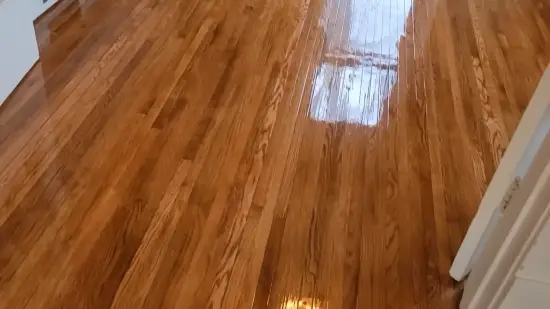
Roomba knows when the room is clean by utilizing its built-in sensor. This sensor allows it to detect the floor’s layout, size, and condition. By doing so, the Roomba can navigate the room efficiently, avoiding obstacles and adjusting its cleaning patterns accordingly.
As your Roomba moves around, it collects data and analyzes the cleanliness level of the floor. Here are some ways the Roomba detects when the room is clean:
- The Roomba detects the absence of dirt and debris on the floor surface.
- It recognizes when there are no more areas that require additional cleaning.
- The sensor detects the absence of any lingering odors or allergens.
- It identifies when all the preset cleaning zones have been covered.
- The Roomba’s sensor can assess the overall cleanliness based on programmed parameters.
With these capabilities, your Roomba can confidently determine when the room is clean and notify you when the job is done.
Protect Your Bamboo Hardwood Floors: Use Roomba Robot Vacuums Properly
Roomba robot vacuums are generally safe for hardwood floors when used correctly, but considering the potential risks when using Roomba robot vacuums on bamboo hardwood floors is important. While Roombas can scratch these delicate surfaces, there are prevention tips that can help minimize the risk.
By taking precautions and using the appropriate settings, you can safely clean your bamboo floors without causing damage. It’s always wise to consult the manufacturer’s recommendations and consider alternative methods if you have concerns.
With proper care, your Roomba can be a valuable tool in maintaining the beauty of your bamboo hardwood floors.

